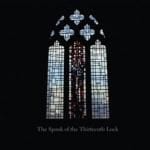
Dublin rockers the Spook of the Thirteenth Lock have released their self-titled debut album of Celtic prog rock, revolutionary folk, and sacred chamber odes. Named for a poem about a haunted lock, The Spook was started by Allen Blighe (Holy Ghost Fathers). He aimed to create something modern from his traditional Irish folk background with his guitar, banjo, and vocals. What resulted is an album of intergalactic Irish-tinged post-rock and sacred and secular folk.
Spook is a dark album of rising up, losing faith, and disillusionment. These themes come forward through the morose lyrics as well as the musical shifts within particular songs. For instance, in “The Lord’s Prayer”, quaint a capella Baroque harmonies give way to raucous buzzing guitars, power chords, and a fervor of drum work (by Brian O’Higgins of Steerage). When the intensity settles back into the mellow refrain, Blighe and multi-instrumentalist/producer Enda Bates continue the vocal harmonies while starting a round. The wavering between slow and elongated versus gigantic and furious expresses the discontentment and loss of faith as well as the lyrics do. Throughout the song the singer’s words maintain reverence for the subject while expressing a divorce from the ideals. “Holy, holy, holy Lord, God of power and might / I’ve lost the will to carry on / I’ve lost the will to fight . . . I wish I had your faith”.
The initial track shows the listener where the music begins: Irish jigs and Celtic cadence. The guitars, accordion, and cavaquinho (by guitarist Donnchadh Hoey, also from Steerage) sound like a section of Irish fiddlers playing a celebratory luncheon. In the midst of these rousing sounds comes a battlecry. “The Hare” tells a tale of revolution via an allegory. The verses form a call-and-response format with Blighe and Bates trading lines and even finishing each others’ sentences. Their repartee almost sounds like the give-and-take of Phish’s “Limb By Limb”. The refrain sounds like a call to arms and precedes a grimy bridge of souring electric guitars and murky processed vocals. “We rose up because we could not stand any lower / Blood begot blood and time will show no mercy to the cruelest foe”.
The centerpiece of the album is “The Partisan”, opening with dueling guitars a la Yes’ “Long Distance Runaround”. The call-and-response setup returns and grows with instrumental ornamentation as the phrases build. Drawing inspiration from both Macedonian folk and the neighboring Italian folklore partisans (hence the song title), the track has a jovial, jester feel. In between verses, the heavier guitar chords create a sludge of electronics before returning to the minstrel-esque vocal harmonies. The noise of feedback and ringing closes out the song after the climactic building of tones.
Epic “The Ragged Rock” finishes the album clocking in at a little over eight minutes. Meditative humming and ohms in multi-part harmonies begin the piece in the traditional Sean Nós style, an unaccompanied Irish type of singing. The continual tones sound like resounding Gregorian chant as Blighe’s beautiful vocals summon a defeatist attitude against the layers of sound. Soon the song opens into soaring vocal protrusions and gritty electronics. O’Higgins picks up the speed and intensity on his kit as several guitar parts travel between one another. Eventually the upward spiral dwindles down into less and less ferocity, emptying into the Gregorian basin of resonance. Thus completes the chaotic, torn journey from disillusion.

![Call for Papers: All Things Reconsidered [MUSIC] May-August 2024](https://www.popmatters.com/wp-content/uploads/2024/04/all-things-reconsidered-call-music-may-2024-720x380.jpg)



